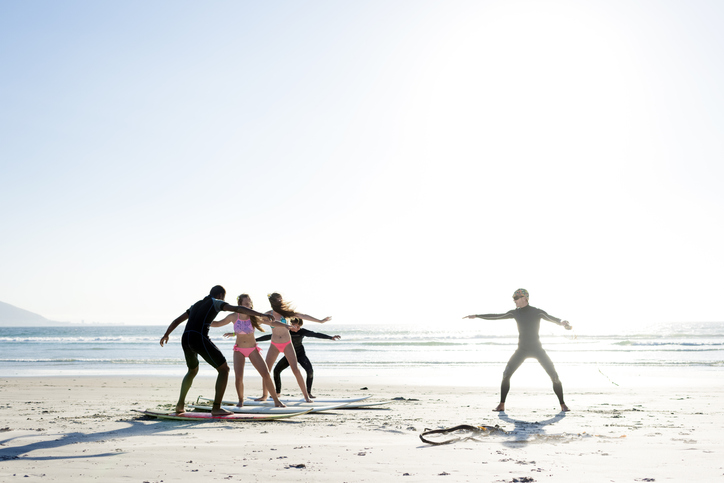There are few sports as exhilarating as surfing—and the cool factor is through the roof. If learning to surf is on your wishlist this summer, you really can learn the skills to ride the waves in the next few weeks, and before you know it, you’ll be eager to take it to the next level.
Starting Out
The biggest asset you’ll need is a great coach, followed very closely by being a great student, and that means putting to test your own serious effort and commitment to succeed. In other words, if you don’t take this task seriously, you could be headed for a wipeout.
While natural aptitude never hurts, surfing instructors say that most beginners can learn the basic skills in anywhere from five to 20 hours, depending mostly on your commitment to practice, practice and then practice some more. Once you get the basics, you’ll probably be impatient to start taking those skills up a few levels.
Before you take your first lesson, you’ll be doing yourself a favor if you familiarize yourself with a few important requirements for the sport. The more prepared you are from the beginning, the faster you’ll pick up the skills.
Skills You’ll Need Before You Get On the Board
- Strong swimming skills
- Upper body strength and endurance for paddling
- Commitment to practice very frequently, even out of the water (yes, that’s possible!)
- Commitment to spend time observing more skilled surfers and how they handle different situations
- Willingness to learn how to “surf forecast” and how to analyze the ocean before you get in the water.
Some of the most important basic steps you’ll need to learn first will likely be: how to properly lie on and balance on a surfboard, how to paddle for a wave and catch it, and how to do the “pop-up” (that quick movement from lying down to jumping up on the board itself), and why the positioning of your feet at that crucial point is so important.
Some practical tips could make your first surfing experiences safer and more enjoyable. Read on!
Tips for Beginners
- New surfers should use surfboards that are larger and wider—it makes learning easier. Plus, bigger boards add extra stability.
- Start with a “soft board,” made of a foam-type material. Not only does the material add buoyancy, it makes it easier for beginners to paddle. It also hurts less when—not if—you fall off your board!
- Avoid big crowds, and be aware of the surrounding people at all times.
- Three ways to “practice surf” when you’re not even in the water: practice positioning yourself properly on your board; work on your paddle technique while properly lying on your board, and perfect your pop-up technique.
- Have fun! Even if it takes you longer than expected to learn the proper techniques, you can still enjoy riding the waves—and building your confidence—as you’re lying down and clinging to your board!
Places to Learn How to Surf in Florida
If you’re ready to begin browsing for surfing instruction in Florida, check out the suggestions below.
- EZride Surf School offers lessons in many locations in central and south Florida, from Orlando to Miami.
- Surfline provides surfing lessons from Jacksonville to South Beach.
- Surf Guys Surf serves the Cocoa Beach and Melbourne areas. Special camps are offered, along with tips on weather, surfing etiquette and packing surfboards for plane flights.
Insure Your Surfboard with Farm Bureau Insurance
Florida Farm Bureau Insurance has served our state with high quality insurance coverage for more than 60 years. In addition to auto, home, and life insurance, we can insure high value personal property like surfboards. To get a no-risk quote, contact a local agent near you using our Agent Finder.

